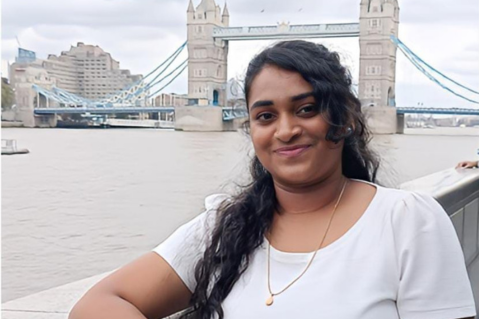 Maushmi Selvamani is studying our Clinical Neuroscience Practice MSc. She tells us about her route into the neurosciences field and her perspective of studying at St George's as an international student.
Maushmi Selvamani is studying our Clinical Neuroscience Practice MSc. She tells us about her route into the neurosciences field and her perspective of studying at St George's as an international student.
"While there have been challenges, it has been an incredibly rewarding experience, shaping me into a more resilient, adaptable, and globally minded individual."
Please tell us about your academic and professional background
I hold a bachelor's degree in Psychology and Sociology, which laid the groundwork for understanding human behaviours within social contexts. Building upon this foundation, I pursued a master's degree in Psychology, specialising in various fields. Through diverse internships, I gained hands-on experience in child development, psycho-oncology, alcohol and substance rehabilitation, adult psychopathology and schizophrenia, and neuropsychology. I am passionate about utilising this knowledge for making contributions to mental health whether through clinical practice, research or community outreach.
Why did you choose to study your course at St George’s?
Neuropsychology intrigued me from all my internship experiences and St George's being a specialist university based in a hospital I felt I could gain as much as I could, both in terms of knowledge and practice, from here.
What do you enjoy most about your course?
The compact infrastructure equipped with numerous facilities that we can access with ease and the fact that it is a university teaching hospital makes it more enriching in the knowledge it delivers.
I love the depth of understanding the course provides for the curriculum, allowing me to explore the latest advancements in neurology and psychiatry. Engaging in intriguing discussions with the passionate faculty and fellow students fosters a collaborative learning experience. The hands-on practical opportunities provide an invaluable real-world experience that's preparing me for an impactful career in mental health.
What are the key skills that you’ve gained during your course?
Pursuing this neuroscience on the neuropsychology route has equipped me with a diverse set of skills to step into the real-world. Aside from the knowledge gained on neuroanatomy, neurophysiology, and pathophysiology of neurological & psychiatric conditions, the course has increased my effective communication and teamwork skills through workshops and multidisciplinary module options. The varied teaching style of each module is helping me learn the clinical skills needed in practice at all levels and boost my confidence.
Please can you tell us about your research project?
I’m currently involved in a research project with the Neuronavigation services team. This team serves as an extensive support mechanism, connecting acute therapists/consultants with patients throughout their neurorehabilitation journey. The project focuses on gathering the experiences of patient caregivers and acute therapists in accessing neurorehabilitation services and ongoing care and also evaluating outcomes of the services with respect to this. Through conducting qualitative focus group interviews I’ve gained valuable skills such as effective communication, facilitation, and data analysis. This project offers an opportunity to develop a deeper understanding of interdisciplinary collaboration and patient-centred care, fostering crucial skills for research and healthcare practice.
How has St George's helped you to develop your career?
The institution’s rigourous academic curriculum led by esteemed faculties delivering each lecture has provided me a comprehensive understanding. The clinical placement and research project has allowed me to apply theoretical knowledge in real-world settings. These have provided valuable networking opportunities in the field of neuroscience and psychology hence making St George's a pivotal contribution in preparing me for a successful and fulfilling career.
What advice would you give to someone considering studying your course?
Research extensively on the curriculum of your course, faculty expertise and available resources and ensure that it aligns with your academic needs and career as well as to know what you can expect. Stay open, curious, and flexible to adapt new challenges and opportunities that arise. Keep yourself surrounded by a support system of friends, peers and faculty who provide guidance and encouragement. Be organised, plan your days and assignments in advance and make use of available time wisely to work around this and be socially active as well. In all, have an open attitude while being organised and proactive.
What benefits do you think St George's has for an international student?
The environment and staff are very welcoming. There are many support services available including the international advice team, student life centre, course faculties and a personal tutor setup, scholarship opportunities, counselling services and much more.
How have you found life and studies in the UK as an international student?
Dynamic and ever evolving where you learn and grow personally, academically, and professionally. A good support system both financially and life-wise is needed as an international student in the UK, which I have found through my parents, the scholarship, and good friends. It has been academically rigourous yet stimulating and encouraged critical thinking, independent inquiry, and excellence. I've appreciated the multicultural environment that provides enriching experiences with dedicated support services.
While there have been challenges in adapting to a unique environment, culture, and education system, it has been an incredibly rewarding experience, shaping me into a more resilient, adaptable, and globally minded individual.
Describe St George’s in 3 words
Diverse. Collaborative. Supportive.